- Home
- William Kennedy
The Ink Truck
The Ink Truck Read online
EARLY BIRD BOOKS
FRESH EBOOK DEALS, DELIVERED DAILY
LOVE TO READ?
LOVE GREAT SALES?
GET FANTASTIC DEALS ON BESTSELLING EBOOKS
DELIVERED TO YOUR INBOX EVERY DAY!
Praise for the Writing of William Kennedy
“Kennedy’s power is such that the reader will follow him almost anywhere, to the edge of tragedy and back again to redemption.” —The Wall Street Journal
The Ink Truck
“Lean, energetic, and grounded in detail and humanity.” —Time
“Wildly funny, rich, and full of lyrical moments.” —People
Riding the Yellow Trolley Car
“Graced with an emotionally satisfying arrangement and a deep appreciation for life’s variety.” —The Washington Post
“As quirky and satisfying a literary journal as its title implies.” —GQ
“There is a spirit of grace and generosity here as Kennedy delights in each of his subjects. He continues to ride his yellow trolley with wonder and delight, and the reader is just as delighted to take the journey with him.” —San Francisco Chronicle
“The writer who emerges here sounds not merely interesting but delightfully genuine. . . . This eclectic collection both entertains and enriches.” —The Dallas Morning News
“Whether he’s discussing his taste for oysters or the plight of the homeless, there’s a touch of the poet about Kennedy.” —Library Journal
“It is Kennedy’s voice that makes this collection sparkle; he is a personable, unique writer, one who studies his craft as well as plies it.” —Booklist
Quinn’s Book
“Richly packed . . . It is Quinn’s endless, apparently effortless invention that dazzles, like a virtuoso musician improvising.” —Publishers Weekly
“As a writer of historical fiction, William Kennedy is unparalleled among his contemporaries. . . . A revelation. Large minded, ardent, alive on every page, it is a novel to savor.” —T. C. Boyle, The New York Times
Very Old Bones
“Few Irish-American writers have produced more haunting portraits of their ancestors or the ghosts that possessed them than Mr. Kennedy has in Very Old Bones.” —The New York Times
“Kennedy’s narrator speaks for a grand cast of saints, eccentrics, artists, blackguards and tarnished heroes, all of whose lives come together in this quirky but consistently fascinating weave of a story. Paternity, aesthetics, the toll and virtues of madness, the tortures of religion, the pains and pleasures of sex and marriage, the pressure of history always pushing at our backs—these are some of the motifs that come to life in Kennedy’s pages.” —The Dallas Morning News
“The very best of William Kennedy’s work.” —The New York Times Book Review
“A complex but beautifully shaped saga.” —Publishers Weekly
“The Phelans can claim a place beside O’Neill’s Tyrones and Steinbeck’s Joads as one of the premier families of American literature. . . . If you think the great books are no longer being written, reading William Kennedy will change your mind.” —Library Journal
“In many ways Kennedy’s most mature and profound work.” —San Francisco Chronicle
The Ink Truck
A Novel
William Kennedy
This book is for
the three elegant ladies I live with:
Ana Daisy
Dana Elizabeth
and
Katherine Anne
Author’s Note
All that needs saying is that this is not a book about an anonymous city, but about Albany, N. Y., and a few of its dynamics during two centuries. Nothing has been changed from the 1969 edition except the design of newspaper headlines on the part title pages, their original galumphishness now banished.
What pleases me most is that the political wisdom that most allowed me to survive a hostile decade has not rotted away. Bailey confronts it most vividly when the Lord Mayor of Cork, Terence MacSwiney, tells him: “Try very hard to …”
Bailey listens, hears.
1984
A BIZARRE BOLLY FOLLOWS INK CARRIER
WHAT’S A BOLLY? PEOPLE ASK
The wise man moves fast, yet a great many times it is hard to catch him. This is because he has no soul. This is because he lives up there with all those radicals.
—ROBERT BENCHLEY
Maxims from the Chinese
Again Bailey dreamed, just before opening his eyes, of an essential oil that when massaged on eyelids became the quicksilver of the brain. The eyes did not then window the soul: They reflected truths of here and there, now and then. But when he opened the eyes and looked at the acoustical-tile ceiling of his bedroom he wondered what kept driving him to such a dream. He had all the truth he could stand. Any more truth about himself or others would tip the balance, turn him into an ape, a goat, a pig.
Bailey rose jerkily from a bed of anguish and plot. Sitting up, he looked through the window of his pajama crotch, saw his pubes growing wild, plucked a few, held one. The Puerto Ricans had a word for it: pendejo. A pube. A jerk.
Who’s calling?
Mr. Pendejo.
Make a noise like a glug and float away with the bath water.
Bailey looked at the sunless day, remembered this was the twelve-month anniversary of the Guild strike. As usual he prepared to go forth to new reversals, a mental habit of Guildsmen. But the anniversary set the day apart. He felt the need to be creative. No sitting in the Guild room waiting for something to happen. No trivial brooding. Something radical was called for.
But before that there was the chore. Mr. Otto.
Bailey looked at Grace, sleeping beside him. Let sleeping animals lie. He stood and dressed himself, shaved and washed quietly. He swallowed half a quart of milk, thinking how the news magazines had convinced him the thip-thip-th-th-thip-thip of his heart was cholesterolated irregularity. Must ingest polyunsaturates. Keep the balance. Chew some corn-oil margarine for lunch.
From the hall closet Bailey took down his checkered sport jacket, his green muffler which dangled to hip length after a once-around twirl, his black cossack hat and his black corduroy car coat with the black fur collar. He tiptoed across the room, opened the door quietly, closed it just as quietly and went down one flight of stairs. He knocked at another apartment door. Knock-knock, knock-knock. Feet shuffled toward the door and from the other side came a hoarse whisper. “Bailey?”
He repeated the double knock-knock. The door opened and a woman in a ragged, coffee-stained nightgown and loose black hair, snarled all the way to her shoulders, smiled at him through sleepy eyes.
“Is your husband home, Mavis?”
Mavis shook her head.
“In that case may I use your telephone?”
Mavis smiled and opened the door wider. When she’d closed it Bailey took her by the shoulders and kissed her lightly on the left eye, then went to the phone on the table beside the bed. He sat on the bed and Mavis lay down beside him, scratching the back of his neck. Bailey dialed the newspaper office and asked for Mr. Otto, the sportswriter.
“Otto here.”
“Sir, my name is Batchford. I believe we have common interests in a matter concerning a person with the initials G.B.”
“Who is this?”
“Batchford, sir. Sterling Batchford. I’m a graduate student of osteopathy and I do believe that the news about G.B. is crucial. I burn to tell you of it, sir.”
“What news? Who’s G.B.?”
“One doesn’t discuss such matters on the telephone, sir. I suggest a meeting at a place convenient to you, say the tavern near your newspaper. Fobie’s, isn’t it? Shall we say ten minutes?”
“I don’t know what this is all about.”
; “It behooves you, sir, to find out. It is, in its own way, a survival matter. I shall await you in Fobie’s.”
“You’re a tease,” Mavis told him. “I thought you came to see me.”
“But I did. Two birds at once. I could have called from Fobie’s.”
“You can’t see much in ten minutes.”
“The briefest of looks is a feast,” Bailey said, raising her nightgown to neck level, patting her here, pat-pat, pat-pat, and there, pat-patty-pat-pat, then pulling the gown back into place.
“Soon,” the woman said. “It’s been such a long time.”
“Soon,” Bailey said, going out the door, escaping, having saved a dime.
He sat on a barstool at Fobie’s, one of five customers, one of two drinking beer, the other three swallowing Fobie’s pale coffee and greasy doughnuts. He sat where he couldn’t be seen from either the window or the doorway and watched for Otto through the back-bar mirror.
Otto entered and stood by the door, looking over the five customers. Bailey swerved on the barstool and confronted Otto suddenly. Otto’s face widened in recognition. He opened the door, started to run, Bailey following.
“The coffee hour is on you, you Jew stick.”
Rosenthal nodded, grunted once and hung up the phone. He stroked his pencil-line moustache, looked at the work on his desk: one sheet of paper with a list of names and phone numbers. Poverty of duty. From the closet he took his black cape off its hook, put on his Tyrolean hat with a fat red feather in its band and grabbed his swaggerstick from the shelf. Bailey said he dressed like a sartorially confused British jewel thief. But he had pursued a specialized image ever since Shirley, his wife, said he had none. He zigzagged from cap to beret, from cane to umbrella, and settled on the cape, an anachronism. What’s out is in. But why did he have to be in? Why did he need an image? Without it you cast no shadow, Shirley said. Look at Bailey’s image, and look at the shadow he casts.
Rosenthal left the Guild room and walked over old snow toward Fobie’s. It was a cold morning, overcast, new snow in the air. Would the winter ever end? At Fobie’s he found Bailey with a captive audience, a stranger who watched Bailey’s face as if it were a television screen. Rosenthal stayed back, listened.
“As a boy,” Bailey was telling the stranger, not loudly for the benefit of all present but with a resonance Rosenthal could tune in, even from a distance, “I wanted to be Jesus. But I got that out of my system and decided to be Ben Franklin. If I couldn’t save people, redeem their spirit, I could at least invent bifocals for them, or the harmonica. I later played the harmonica, trying to make music for them, trying to be a minstrel of my time. But the harmonica didn’t make it, and when I added the ukulele I found that too missed the mark.”
The stranger stared vacuously at Bailey. Compulsive Bailey, Rosenthal thought. You’ll talk to anybody. But talk that deceives, that never gets to the Bailey center. Never gets to the unspoken Bailey. The unspeakable Bailey.
“I found my mother lode in the news columns,” Bailey went on. “I invented new phases of bifocalism, figuratively, of course, and shot everything through with a little bit of Jesus stuff, set to music. And they loved it. They paid me big money, shoveled the old honors at me. I was all set for my skyrocket time—there he goes, the Bailey comet. I was on edge, I tell you. Ready to ride. And then we went on strike.”
The stranger blinked only when Bailey stopped talking. Bailey drank his beer, licked his lips. Rosenthal moved in.
“What a coincidence finding you here,” Rosenthal said. “I didn’t know you drank.”
“I came in to dry my underwear,” Bailey said.
“I’ll have a drink.”
“No coffee?”
“It’s been a bad morning.”
“Drinks, Fobie,” Bailey said to the owner-bartender, “for all the true men in the house. My trucking friend here,” and the stranger nodded, “plus one for yourself of course, you old piddlebox. And one for this elegant strand of spaghetti here, this paragon of style and suavity, this Tyrolean feather duster. But none for the scabs, Fobie. You don’t serve scabs, anyway, do you, old boy?”
Fobie snarled at the thrust. A sickly little man, he was renowned for his lectures on the evils of fresh bread and World War One cooties, and for having described a Negro customer as being black as the ace of coal. As the Guildsmen’s number diminished from the long strike and they faded away from Fobie’s, he made new customers of the scabs. Now he resented their being made uncomfortable, resented Guildsmen bickering with them, fighting them.
“Scabs are the pus people,” Bailey said. “Cans of rich vomit. Bottles of pee.”
Rosenthal looked down the bar at the customers he knew to be scabs. They ignored Bailey. None of them wanted another fight. Bailey was built like a black bear, an ox, a rhinoceros. The scabs called him a maniac, a communist. His image at Fobie’s changed regularly, depending on his last outrage. With the lady customers it was something else. Look out, girls. Here comes the wicked-eyed Baileywhaley down the street in his sperm suit.
Fobie set up three beers.
“You make enough noise for two dozen things,” Fobie told Bailey.
Bailey smiled, turned to Rosenthal. “You have something on your secret Jewish mind,” he said. “You stride up here like a regular Yiddisha barleycorn when I know you hate the stuff, long for absinthian cups from the exotic tongue spots of Europe. You crave the Jewish continental culture. You favor pumpernickel. You loathe the American proletariat.”
“Mushmouth,” Rosenthal began, “I have a message to you from our leader.”
“From our leader,” Bailey said, removing his Russian hat and placing it over his heart.
“There is to be a motorcade.”
“Oh, my sweet bottom.”
“Tonight.”
“Oh, no. No. How could he still believe in motorcades?”
“Don’t ask absurd questions.”
“But we don’t have any motors.”
“Do you think Jarvis really cares about such details?”
Bailey considered the development. The last motorcade drew only twelve members and five cars, plus two volunteers from other unions. That was a month and a half ago to celebrate Jarvis’ birthday and to harass drivers getting a fat pre-Christmas edition on the street. The motorcade delayed one truck eight minutes. Jarvis scored it a victory and turned forty in a haze of glee.
“We’re getting lax in our militancy,” Rosenthal said.
“Is that what he thinks?”
“So we’ll harass the ink truck that we hear is due in tonight from New Jersey. We’ll ride round and round and make them nervous over there.”
“Ink truck,” said Bailey.
“But no violence. Just militancy. His precise word was fuss.”
“Fuss him,” Bailey said. “I’ll bomb the son of a bitch when it gets here.”
Rosenthal smiled, battened down his hat, put on his gloves.
“Got to get back and call the membership.”
“Nobody will come,” Bailey said. “Don’t waste your time.”
“It’s an order.”
“You’re a fool.”
“I know it,” Rosenthal said.
“You sit up there making phone calls, making notes, following Jarvis’ orders. Sometimes I think you believe the man who does his duty will end up all right. But if you accept the framework, you’re done for. Drink is oil for unauthorized movement. A wrench in the gears of doom. Have another beer. There’s not enough time for us to win this strike.”
“You may be right.”
“You really are a fool.”
“Right again,” Rosenthal said, holding his beer in his gloved hand, finishing it. He adjusted his cape and picked his swaggerstick off the bar.
“Listen,” Bailey said. “Come to lunch today at the house.”
“What house?”
“My house.”
“Your house?”
“Exactly.”
“What time?”
“Lunchtime.”
“I used to drive an ink truck,” the truck driver said.
“Ink truck?” said Bailey.
“I heard you say ink truck. I used to drive one.”
“You drove an ink truck,” Bailey said.
“I heard you talkin’ about one.”
“You heard us talking.”
“This is too deep for me,” Rosenthal said. “See you at lunch,” and he went out.
“Now,” Bailey said to the driver.
“No. Not now. I used to.”
“I’m afraid I don’t understand.”
“I say I used to drive an ink truck.”
“An ink truck,” Bailey said.
Rosenthal approached an alley half a block down the street from Fobie’s at the approximate moment that an ambulance pulled to a stop in front of it. The attendants lifted a stretcher onto the sidewalk, wheeled it toward the alley, then lifted a bloody-headed figure out of the snowcapped rubble and onto the stretcher’s white sheet. As they covered the man with a blanket Rosenthal saw a bone sticking through bleeding elbow flesh, heard the man groan, seemed to recognize him as a scab from the editorial department. But with such a bloodied face Rosenthal couldn’t be sure.
The phone was ringing when he entered the empty Guild room.
“Guild,” he said.
“Listen,” Bailey said. “I could throw one grenade into the motor of the truck and another through the press-room window.”
“Did you forget that the press-room windows are reinforced with steel mesh? A grenade would just bounce off.”
“You gutless scab,” Bailey said, and hung up.
Rosenthal put his clothes in the closet and waited for Bailey to call back. When the phone rang he picked it up and said, “Uh huh.”
“Hang one grenade on the wire mesh,” Bailey said, “and when that explodes toss a second one through the breach.”

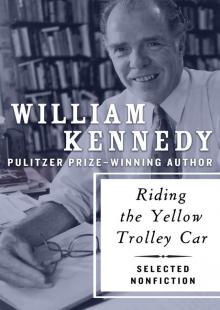 Riding the Yellow Trolley Car: Selected Nonfiction
Riding the Yellow Trolley Car: Selected Nonfiction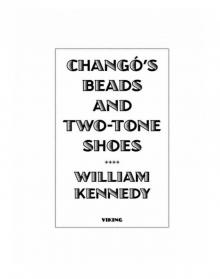 Changó's Beads and Two-Tone Shoes
Changó's Beads and Two-Tone Shoes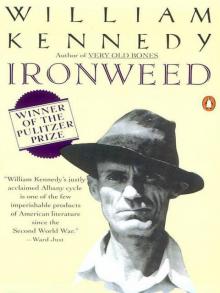 Ironweed
Ironweed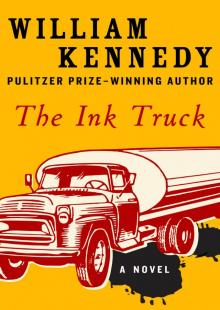 The Ink Truck
The Ink Truck Billy Phelan's Greatest Game
Billy Phelan's Greatest Game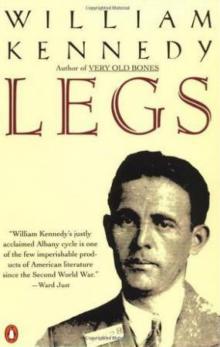 Legs
Legs Very Old Bones
Very Old Bones The Last Mission
The Last Mission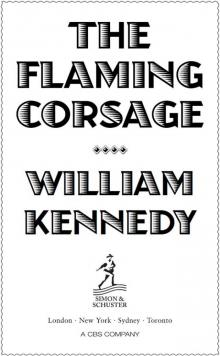 The Flaming Corsage
The Flaming Corsage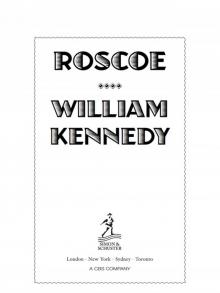 Roscoe
Roscoe Quinn's Book
Quinn's Book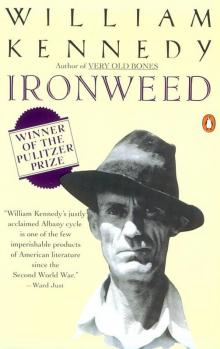 Ironweed (1984 Pulitzer Prize)
Ironweed (1984 Pulitzer Prize)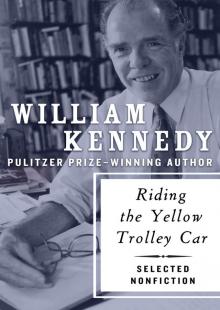 Riding the Yellow Trolley Car
Riding the Yellow Trolley Car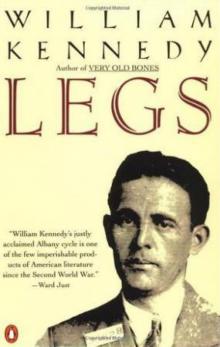 Legs - William Kennedy
Legs - William Kennedy